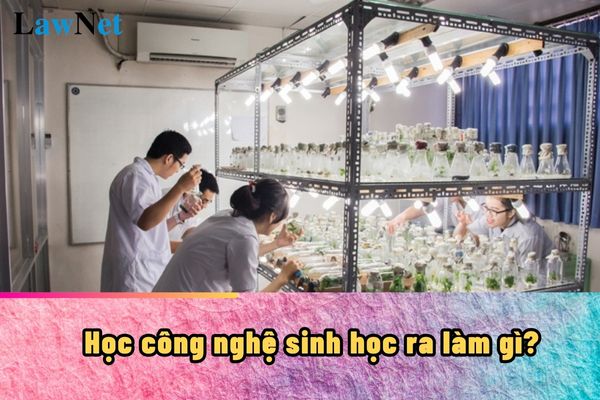What job can students, who graduate biotechnology, apply for in Vietnam?
What job can students, who graduate biotechnology, apply for in Vietnam?
Biotechnology is a field of study in universities, colleges, or vocational schools focusing on the research and application of living organisms combined with processes and technical equipment to create and manufacture products on an industrial scale that serve human benefits, economic-social development, and environmental protection.
To be specific, biotechnology products are applied in daily life, such as the production of medicines, etc
Some job positions for Biotechnology graduates include:
[1] Production management engineer, quality control and assurance at pharmaceutical and food manufacturing plants;
[2] Biotechnology specialist at companies processing agricultural products, food, and seafood; testing centers, laboratories, and research institutions dealing with microbiological technology, plant biotechnology, and animal biotechnology;
[3] Medical sample analysis specialist; laboratory staff in hospitals and medical centers;
[4] Biomedical engineer;
[5] Environmental engineer;
[6] Agricultural engineer;
[7] Chemical engineer;
[8] Staff member in the biotechnology product development department;
[9] Starting your own production facility.
Information provided is for reference only.
How many credits are required for intermediate-level biotechnology major in Vietnam?
Based on Subsection 1 of Section B, Part 12 of the Regulations on the Minimum Knowledge Amount, Competency Requirements That Learners Must Achieve After Graduating from Vocational and College Levels for Fields in Technology-Architecture, Construction Engineering, Mechanics, Electricity, Electronics, Communications, and Chemistry (referred to as the Regulations) issued along with Circular 45/2018/TT-BLDTBXH as follows:
General Introduction to the Field
An intermediate-level biotechnology is a field that applies technology based on life sciences, combined with modern technical equipment and processes to exploit the living activities of microorganisms, animal and plant cells to produce on an industrial scale to create high-quality biological products serving human life, social development, and environmental protection, meeting Level 4 requirements in the Vietnam National Qualifications Framework.
Biotechnology products are widely applied in human life, such as vaccines, antibiotics, medical products, fermented foods, biological active substances, functional foods, plant and animal breeds, pesticides, etc.
Graduates with a vocational diploma in biotechnology can perform tasks in laboratories and production facilities to conduct scientific and technical experiments in analysis, testing, and producing products related to biotechnology, such as:
- Conducting basic, specific, complex experiments; these experiments can be performed in various fields, such as the production of microbiological preparations, fermented foods, high-tech agricultural products, plant propagation, etc.;
- Collecting information, and experimental requirements, and working with related parties (laboratory staff, customers, or suppliers) to resolve non-compliant products;
Minimum knowledge amount: 1,700 hours (equivalent to 60 credits)
Thus, according to the above regulation, studying intermediate-level biotechnology requires a minimum of 1,700 hours equivalent to 60 credits, but the specific number of credits required for graduation depends on the training program of each school.

What job can students, who graduate biotechnology, apply for in Vietnam? (Image from the Internet)
What knowledge are required upon completing intermediate-level biotechnology program in Vietnam?
Based on Subsection 2 of Section B, Part 12 of the Regulations issued with Circular 45/2018/TT-BLDTBXH, the knowledge required upon completing intermediate-level biotechnology program includes:
- Presenting definitions, structures, functions, and components of plant and microbial cells;
- Describing the principles of biological processes, and the growth processes of plants and microorganisms;
- Presenting standard operating procedures: aseptic techniques, using microscopes, biological testing, chemical testing, molecular biology experiments, food testing, analyzing environmental parameters, performing plant propagation processes, producing microbiological preparations, fermented products, high-tech agricultural products, and quality control of products;
- Describing the operation and maintenance of equipment and tools used in the application of biotechnology processes;
- Presenting labor safety regulations, industrial hygiene, and biosafety;
- Describing management principles, planning methods, organizing implementation, monitoring, evaluating processes in the biotechnology field;
- Presenting foundational knowledge of politics, culture, society, law, national defense and security, and physical education.

